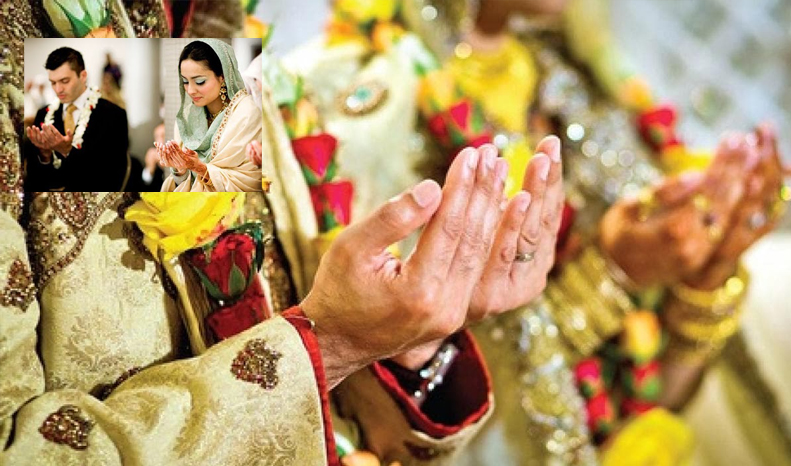Muslim Law in India means " that portion of Islamic Civil Law which is applied to Muslims as a personal law". It consists of injunctions of Quran and has been further supplemented and modified by state Legislation and modern judicial precedents of the High Courts and the Supreme Court of India and also of the Privy Council.
Marriage/'Nikah' according to Muslim Law is a contract underlying a permanent relationship based on mutual consent.
Essential Features
1. A Muslim marriage requires proposal (Ijab) from one party and acceptance (Qubul) from the other as is required for a contract. Moreover there can be no marriage without free consent and such consent should not be obtained by means of coercion, fraud or undue influence.
2. Just as in case of contract, entered by a guardian, on attaining majority, so can a marriage contract in Muslim Law, be set aside by a minor on attaining the age of puberty.
3. The parties to a Muslim marriage may enter into any ante-nuptial or postnuptial agreement which is enforceable by law provided it is reasonable and not opposed to the policy of Islam. Same is the case with a contract.
4. The terms of a marriage contract may also be altered within legal limits to suit individual cases.
5. Although discouraged both by the holy Quran and Hadith, yet like any other contract, there is also provision for the breach of marriage contract.
REQUIREMENTS
The solomonisation of marriage requires adherence to certain forms and formulas. They are called the essentials of a valid marriage. If any of these requirements is not fulfilled the marriage becomes either void or irregular, as the case may be. Thus the essentials are as follows:
1. Proposal and Acceptance
2. Competent parties
3. No legal Disability
Procedure
1. Marriage like any other contract is constituted by ijab-o-qabool, that is by declaration and acceptance. One party to the marriage must make an offer (Ijab) to the other party. The marriage becomes complete only when the other party has accepted the offer.
2. According to Muslim Law it is absolutely necessary that a man or someone on his behalf and the woman or someone on her behalf should agree to the marriage at one meeting and the agreement should be witnessed by two adult witnesses.
3. The Words conveying proposal and acceptance must be uttered in each other's presence or in the presence of their agents, who are called Vakil's.
4. The other condition for a valid marriage is that the transaction must be completed at one meeting. A proposal made at one meeting and an acceptance at another meeting do not constitute a valid marriage.
5. There must be reciprocity between offer and acceptance. The acceptance must not be conditional
Under the Sunni Law, the proposal and acceptance must be made in presence of two males or one male and two female witnesses who are sane, adult and Muslim. Under Shia Law, witnesses are not necessary at the time of marriage. They are required at the time of dissolution of marriage.
6. The parties contracting marriage must be acting under their free will and consent.
Competent parties & legal disabilities
The Parties to a marriage must have the capacity of entering into a contract. They must be competent to marry. Muslim who is of sound mind and who has attained puberty may enter into a contract of marriage. The parties must be able to understand the nature of their act.
LEGAL DISABILITY
Means the existence of certain circumstances under which marriage is not permitted. These prohibitions have been classified into four classes:-
1. Absolute incapacity or prohibition
2. Relative incapacity or prohibition
3. Prohibitive incapacity
4. Directory incapacity
1. ABSOLUTE INCAPACITY OR PROHIBITION: arises from:
i. Consanguinity
ii. Affinity
iii. Fosterage
i. Consanguinity means blood relationship and bars a man from marrying:
• His mother or grandmother how highsoever,
• His daughter or grand-daughter how lowsoever,
• His sister whether full, consanguine or uterine,
• His niece or great niece how lowsoever,
• His aunt (fathers sister, mothers sister) or great aunt, how highsoever, whether paternal or maternal A marriage with a woman prohibited by reason of consanguinity is void. Issues from such marriage are illegitimate.
ii. Affinity prohibits a man from marrying:
• His wife's mother or grand-mother how highsoever
• His wife's daughter or grand-daughter how lowsoever Wife of his father or paternal grand-father how highsoever
• Wife of his son or son's son or daughter's son how lowsoever
• A marriage with a woman prohibited by reason of affinity is void.
iii. Fosterage means when a woman other than its own mother has suckled a child under the age of two years, the woman becomes the foster-mother of the child. A man may not, for instance, marry his foster-mother or her daughter, or his foster sister.



